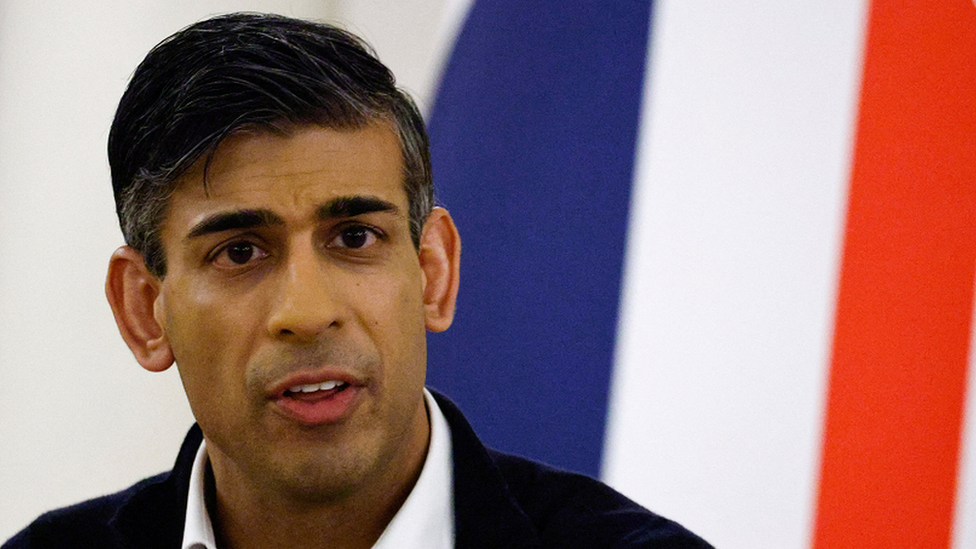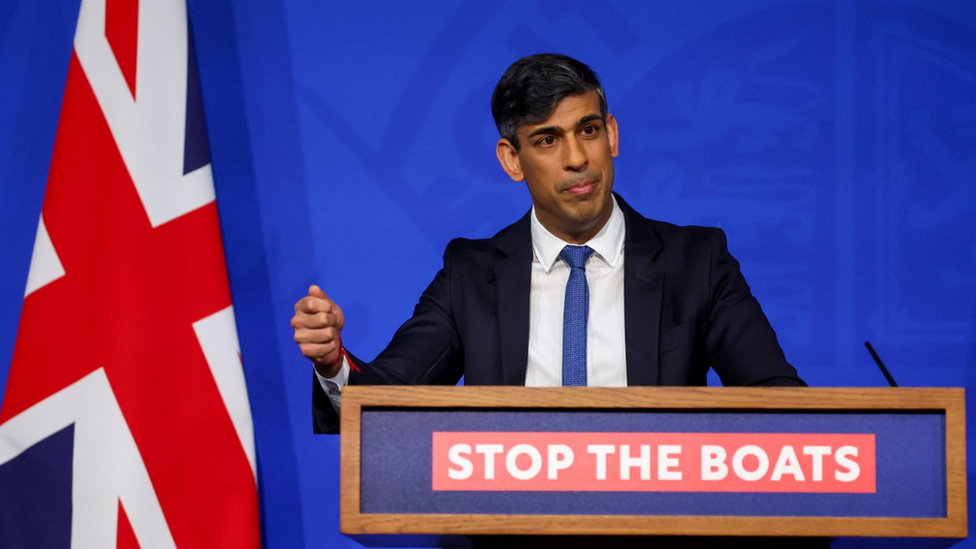Sunak gears up for battle on Rwanda bill
- Published
- comments

The prime minister is facing another long week in the House of Commons.
First up on Monday his statement on British involvement in strikes against Yemen's Houthi rebels, and why the decision was made without consulting MPs.
But attention will quickly turn - once again - to his flagship Rwanda immigration plan.
You might remember before Christmas, after vast amounts of hullaballoo, the government's plan passed its first big stage in the Commons.
From Tuesday, it will be front and centre of a fresh Commons debate.
The plan would see the government send some asylum seekers arriving in the UK to Rwanda for processing.
The UK signed a deportation deal with the African nation in 2022 and insists the policy would deter people arriving to Britain on small boats via the English Channel.
But the UK Supreme Court said the plan was unlawful because of the risk that asylum seekers sent to Rwanda could be returned to their home countries, where they could face harm.
Now, ministers are working up a plan which they hope will be lawful: a bill declaring that Rwanda is a safe country.
But some Conservative MPs reckon the plan isn't strong enough and is likely to fail, and so want to amend it.
Before I dive into the detail, I want to draw a distinction between two crucial things at Westminster generally, and in this row in particular: noise and numbers.
Before Christmas, there was rather a lot of the former, and not a lot of the latter.
In other words, those Conservative MPs who think the government's plans are wishy washy and won't work made a lot of noise to that effect, but didn't, in the end, vote against them.
They know they got teased as "cowardly custards" by some. But they said they would be back in the new year.
Well, here we are - and the volume is notching up again.
Some are encouraged, even excited, that the Conservative Deputy Chairman, Lee Anderson, appears to have indicated he is willing to support some of the amendments.
And Business Secretary Kemi Badenoch isn't denying a report in The Times, external that she privately warned Downing Street before Christmas that the current plans don't go far enough.
But are there actually the numbers to defeat the government?
On Tuesday and Wednesday, at what is known as the Committee Stage of the law-making process, MPs will debate and vote on the plans.
Loads of amendments have been tabled.
It will be up to the Deputy Speaker, Eleanor Laing, to determine which ones are selected.
The leaders of three Conservative backbench tribes, the European Research Group, the Common Sense Group and the New Conservatives said at the weekend around 60 Tory MPs have backed amendments aimed at toughening up the legislation, as they see it.
Many are particularly keen on two ideas.
Firstly, stopping the very thing that stood in the way when the government tried to make this idea work the first time round.
Back in June 2022 a plane was ready to go - until it wasn't, when the European Court of Human Rights intervened at the last minute.
So, some Conservative MPs want ministers to have the authority, as a default, to ignore these injunctions.
Secondly, they also want to significantly limit the number of personal circumstances a migrant could cite to avoid being sent to Rwanda.
The key thing here is these amendments will not pass: The government doesn't support them, and neither do the opposition parties.
So two things really matter: How many Conservative MPs are actually willing to vote against the government's plans, if they are not changed?
That vote, at what is known as Third Reading, will come on Wednesday night if the bill hasn't been amended.
I am struck at this stage that while those wanting amendments talk confidently about their support, they are considerably more circumspect when it comes to how many of those supporters would actually be willing to vote the entire Rwanda plan down and inflict a credibility crushing defeat on Rishi Sunak.
Again, remember the difference between noise and numbers.
As things stand, the mood music from government appears relatively confident.
They will argue the only chance to get the Rwanda plan up and running before the election is to back them.
If things do start looking shaky from No 10's perspective, could they offer any concessions?
They don't have much room for manoeuvre, as Conservative MPs broadly on the left of the party say the bill should remain as it is.
And the Rwandan government has said publicly the plan must remain within international law, which is why some of those arguing for changes insist their ideas are compliant with this.
Let's see.
And remember, even if after this week's noise the government does win, the plans then head off to the House of Lords.
There is plenty of mileage in this argument yet.
Related topics
- Published13 June 2024

